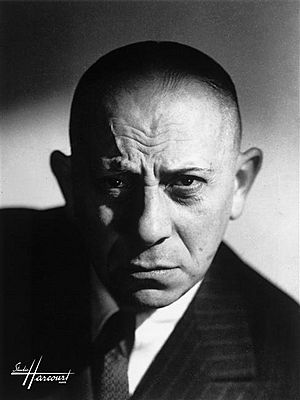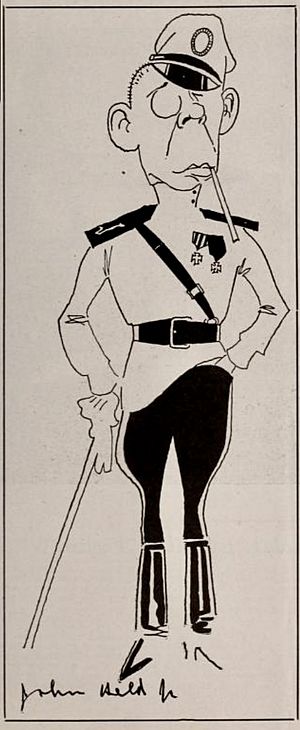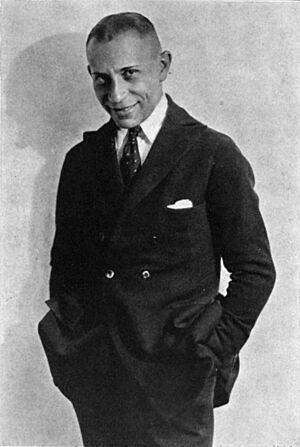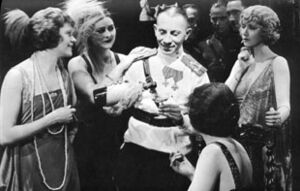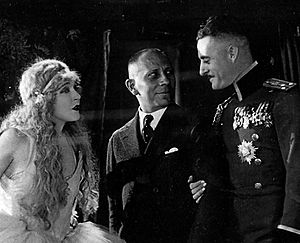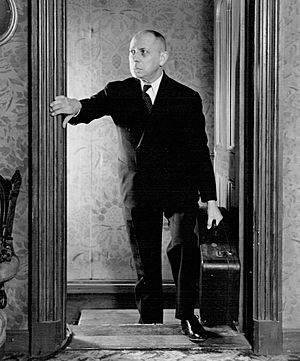Erich von Stroheim facts for kids
Erich von Stroheim (born Erich Oswald Stroheim; September 22, 1885 – May 12, 1957) was an amazing Austrian-American film director, writer, and actor. He was especially famous during the silent movie era. His 1924 film Greed is still seen as one of the most important movies ever made.
Erich von Stroheim was known for being a very creative director. He brought more complex stories and deeper feelings to movies. Later in his career, he became a respected actor, especially in French films. He passed away in France in 1957 at the age of 71.
Contents
Early Life and Journey to Hollywood
Erich Oswald Stroheim was born in Vienna, Austria, in 1885. His father was a hatmaker.
In 1909, Stroheim moved to America. When he arrived, he claimed to be a count from Austrian nobility. This was a bit of a story, but it fit the fancy characters he would later play in his movies! He first worked as a traveling salesman, which led him to Hollywood.
Even though he played noble characters, people who knew him said he spoke with a regular Austrian accent. Later, he even claimed to have "forgotten" his native German.
Stroheim was married three times. He later lived with actress Denise Vernac from 1939 until his death. She also appeared with him in several films. Two of his sons, Erich Jr. and Josef, also worked in the film industry.
After acting in the famous 1950 film Sunset Boulevard, Stroheim moved to France. There, his silent films were greatly admired by French filmmakers. He continued to act in movies and wrote several novels. He was even given the French Legion of Honour award shortly before he died.
Stroheim passed away in France in 1957 at age 71.
Film Career Highlights
By 1914, Erich von Stroheim was working in Hollywood. He started as a stuntman and took small acting roles. He also helped filmmakers understand German culture and fashion. His first credited acting role was in Old Heidelberg in 1915.
He worked with famous director D. W. Griffith on the film Intolerance. When America entered World War I, Stroheim often played German villains in movies. He was very good at making audiences dislike his characters!
Directing Style and Famous Films
After the war, Stroheim started writing and directing his own films. His first movie as a director was Blind Husbands in 1919, which he also starred in. As a director, Stroheim was known for being very demanding. He had a clear vision for his films and paid great attention to every detail. He is considered one of the best directors of the silent movie era. His films often showed a realistic and sometimes cynical view of human nature.
One of his most famous films as a director is Greed (1924). It was based on the novel McTeague. Stroheim wanted to make a very detailed movie, filming in real locations like San Francisco and Death Valley. The original version of Greed was incredibly long, about 10 hours! The studio thought it was too long and cut it down a lot. Stroheim was very upset about this. Even so, many film experts still consider Greed a masterpiece.
Stroheim's next big film was The Merry Widow (1925), which was very successful. He also directed The Wedding March.
Stroheim's strong artistic ideas and his high budgets often led to disagreements with the big Hollywood studios. Because of this, he directed fewer films over time. For example, he was removed as director from the film Queen Kelly (1929) after problems with the star Gloria Swanson and producer Joseph P. Kennedy.
Return to Acting
After his directing opportunities became rare, Stroheim focused on acting again. He appeared in both American and French films. His serious personality and villainous roles earned him the nickname "the man you love to hate."
He is very well-known for his acting roles in two classic films:
- In Jean Renoir's La Grande Illusion (1937), he played Captain von Rauffenstein, a German officer.
- In Billy Wilder's Sunset Boulevard (1950), he played Max von Mayerling, a former silent film director who now works as a butler. This role was very special because it mirrored parts of Stroheim's own life. He was even nominated for an Academy Award for Best Supporting Actor for this role.
Erich von Stroheim's career showed his amazing talent as both a director and an actor. He left a lasting mark on film history.
Selected Filmography
Here are some of the important films Erich von Stroheim directed or acted in:
As Director
- 1919: Blind Husbands (also starred)
- 1922: Foolish Wives (also starred)
- 1924: Greed
- 1925: The Merry Widow
- 1928: The Wedding March (also starred)
- 1932: Queen Kelly
As Actor
- 1915: Old Heidelberg
- 1916: Intolerance
- 1918: The Heart of Humanity
- 1929: The Great Gabbo (his first "talkie" film)
- 1937: La Grande Illusion
- 1943: Five Graves to Cairo
- 1950: Sunset Boulevard
- 1955: Napoléon (his last film)
Quotes
Erich von Stroheim had some famous quotes about filmmaking and Hollywood:
"Lubitsch shows you first the king on the throne, then as he is in the bedroom. I show you the king in the bedroom so you'll know just what he is when you see him on his throne."
"If you live in France, for instance, and you have written one good book, or painted one good picture, or directed one outstanding film 50 years ago and nothing else since, you are still recognized and honored accordingly. People take their hats off to you and call you 'maître'. They do not forget. In Hollywood—in Hollywood, you're as good as your last picture. If you didn't have one in production within the last three months, you're forgotten, no matter what you have achieved ere this."
See also
 In Spanish: Erich von Stroheim para niños
In Spanish: Erich von Stroheim para niños
- List of German-speaking Academy Award winners and nominees
 | Tommie Smith |
 | Simone Manuel |
 | Shani Davis |
 | Simone Biles |
 | Alice Coachman |


